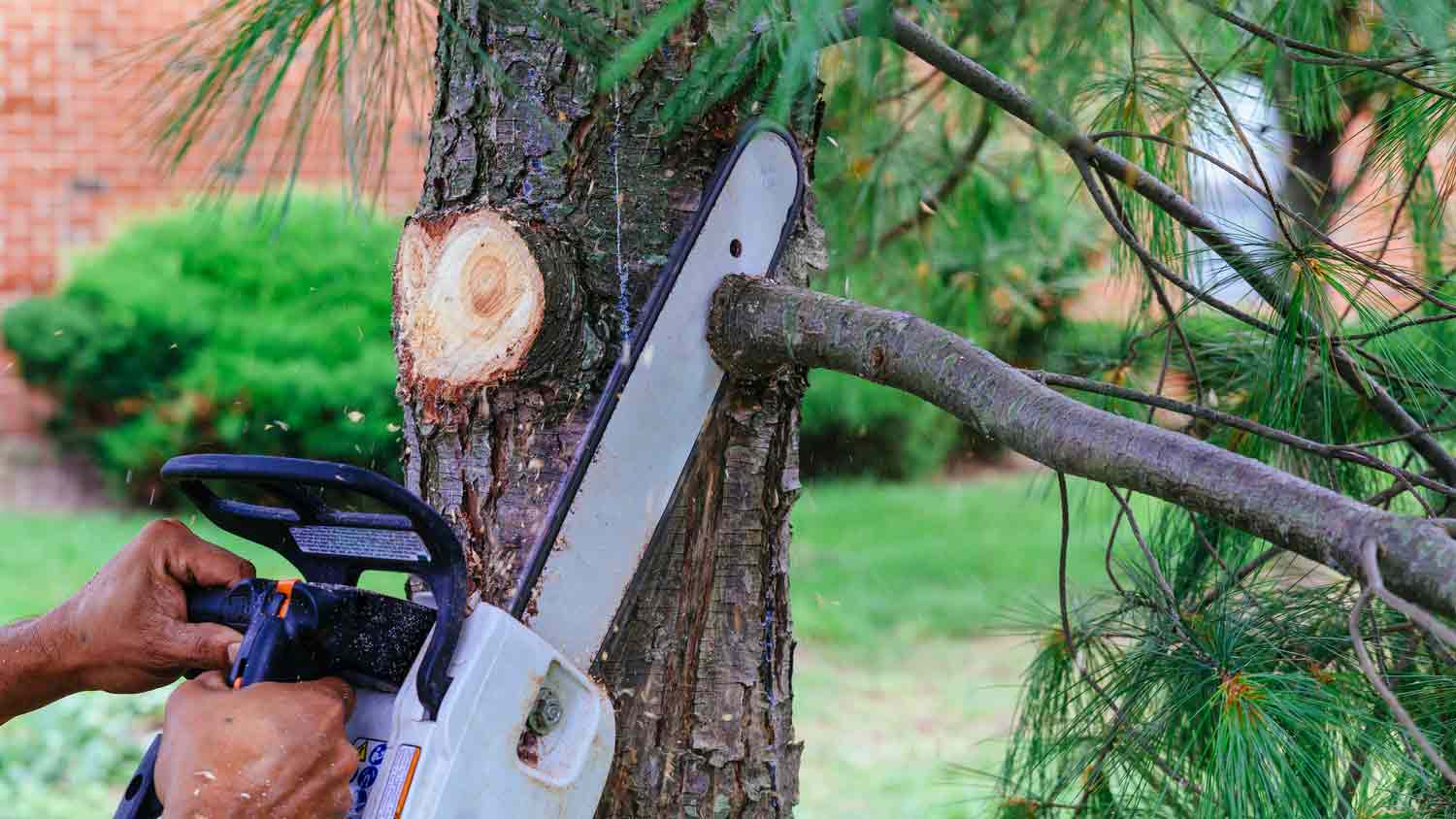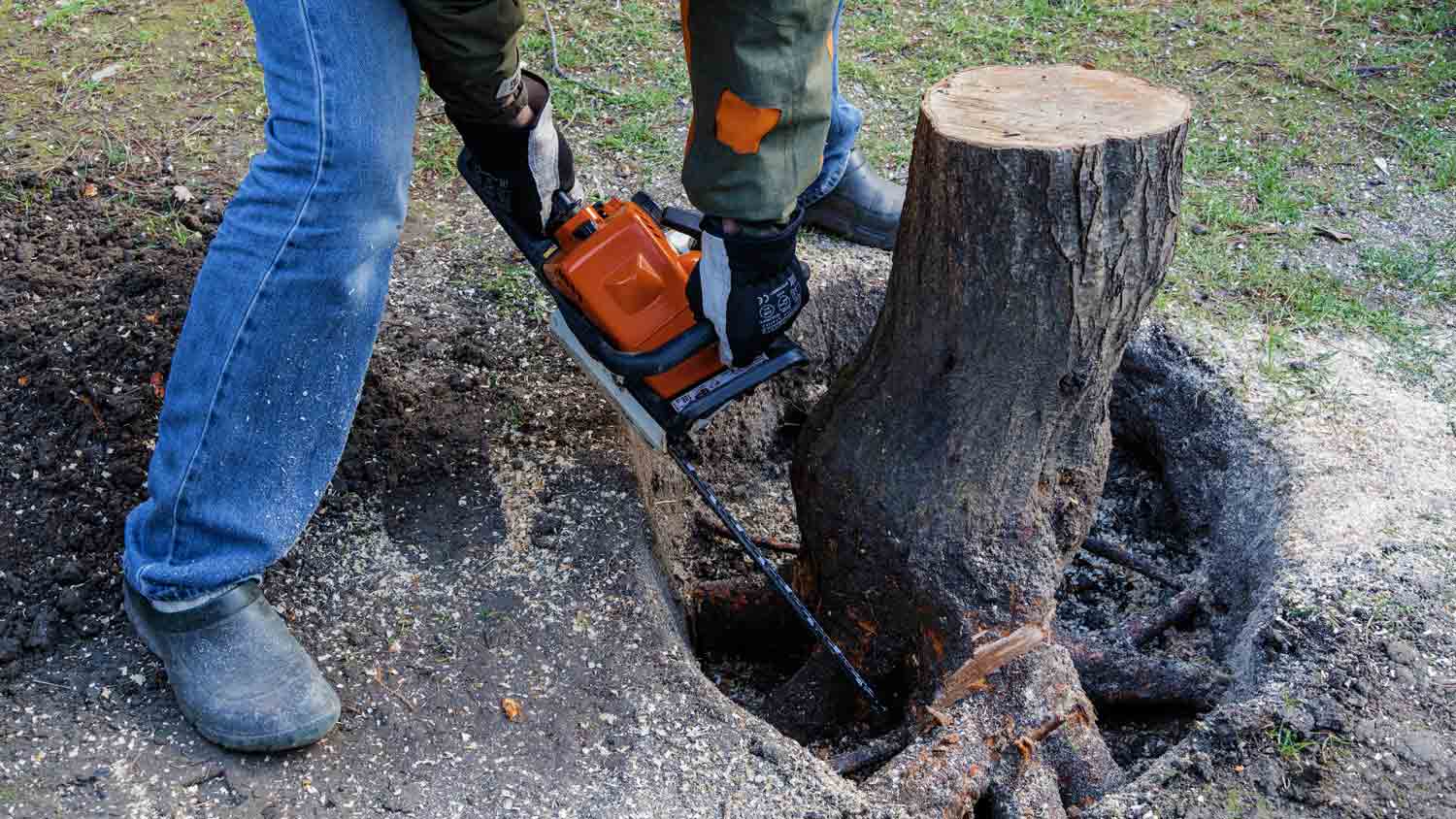
Get a clear estimate of palm tree maintenance cost, including trimming, fertilization, and pest control, so you can keep your palms healthy and your budget on track.
Level the playing field on your property


Whether you’re building a new structure on your property or removing hazardous trees, you may need to learn how to clear trees from your yard. Clearing small trees on your own is an option, but removing large trees is a time-consuming and labor-intensive process that requires professional planning and execution.
Since tree clearing is an extremely hazardous project, we strongly recommended hiring a tree cutting pro rather than attempting to clear all the trees yourself. However, if you’re set on DIY and armed with the proper knowledge and safety precautions, this guide will help you learn how to clear trees from land.

Clearing away trees from your property is a major undertaking. It’s safest to hire a professional to take on this task, but these are the basic steps to clear trees from land:
The first step is to check the legalities of tree clearing in your area. Determine whether your local government requires special permits or inspections. You’ll want to make sure your bases are covered to prevent fines or similar complications. You should contact your utility companies before digging or working near power lines.
Always wear appropriate safety gear, such as work gloves, safety goggles, steel-toed boots, and a construction or logger’s helmet. You should also wear ear protection when operating a chainsaw.
Start your project by surveying the land to develop a comprehensive plan, considering factors such as large roots, soil quality, structures, and other elements that might impact tree removal. Decide which trees, if any, will be staying and mark them if needed.
If this is your first time, learn how to cut down a tree safely before proceeding or hire a tree cutting professional for the task. Start with the outermost tree and plan your felling zone so it lands in the surrounding landscape rather than other trees. Use a chainsaw and felling notches to remove the tree at its base, angling it so it falls in the felling zone.
Repeat this process for each tree you want to clear, clearing away debris and carefully moving outward and away from nearby structures. Always plan an escape route for yourself in case the tree felling doesn’t go as planned.
Once your trees are down, you’ll need to limb them to break them into smaller pieces for removal. Begin by cutting off non-supporting branches, making single cuts for non-tension-bearing branches, and multiple shallow cuts for spring pole branches to release tension without causing kickbacks.
Work methodically through each section, engaging the chain brake when necessary and swiftly removing supporting branches from the underside of the trunk while standing clear of the falling sections.

Finally, decide between the best methods of stump removal. Always call 811 or your local dig line before proceeding with stump removal to avoid damaging underground power lines.
From there, you can manually dig up the stump, or learn how to burn a stump or how to kill a stump. You can also invest in the cost to rent a stump grinder to make quick work of the leftover stumps. However, the safest option is to hire a professional stump grinder who can eliminate multiple stumps in one service, saving money and clearing the land faster.
By hiring a professional tree trimming service to tackle the project, they ensure that trees are cleared safely from areas with utility lines, pathways, and roads. This is essential because it provides safe and unobstructed access to infrastructure and utilities to maintain public safety. The cleared areas must be maintained to prevent regrowth and keep the path clear for ongoing operations.
Clearing trees can make your yard uneven and leave holes and gaps where they were removed. Grading involves adding soil as needed, then leveling and shaping the area to ensure it drains properly. A well-graded lawn is also aesthetically pleasing, which can enhance curb appeal.
There are several different methods professionals use for commercial tree clearing, such as:
Pushing and Pulling: These are two common techniques: One uses a bulldozer to clear the area of trees, while the other utilizes chains to secure the tree and pulls it with heavy machinery, such as a tractor.
Cutting and Grinding: This method involves using tools such as chainsaws and other types of equipment to cut and clear trees from land. Then, pros use machinery like a forestry mulcher or a stump grinder to break down the trees into mulch.
Burning the Piles: In some instances, professionals push all the trees and debris into piles and burn them as a controlled fire. This method is not legal in all municipalities or recommended for DIY work, as the fire can quickly spread if it is not done correctly.
Keep these guidelines in mind when clearing multiple trees from your land.
Be aware of your surroundings at all times—watch for signs of stress or shifting in trees, and be cautious of unstable ground or unexpected hazards.
Remove cut branches and debris regularly to maintain a clear work area, reducing trip hazards and ensuring better visibility.
Safely store equipment when not in use to prevent accidents.
For larger trees or complex situations, seek professional assistance to ensure safety and avoid potential risks.
Take plenty of breaks and stay hydrated.
Don’t hesitate to reach out to a pro if you become overwhelmed.
Aside from practical or aesthetic reasons, there are a few other situations where clearing trees from land is imperative. Firstly, if you notice signs that the trees are dead, you’ll need to make a removal plan before they become a major hazard. Dead trees can fall and cause property damage, plus they can harbor termites and other pests. They’re also highly combustible and can fuel for wildfires, especially during dry seasons.
Another important time to learn how to clear trees from land is if they are close to existing or future structures. Tree roots can damage your home’s foundation, as well as the foundation of other structures on your property. Whether you’re planning to build or make room around an existing structure, clearing the trees will help prevent any foundational problems down the line.
Even for seasoned DIYers, cutting down a tree—let alone multiple trees—is extremely hazardous. A local tree cutting service is strongly recommended for this project to help you get it done safely. Tree cutting pros are well-versed in how to clear trees from land and they will quickly, safely, and efficiently take care of tree removal.
Tree removal costs can range from $200 to $2,000 per tree, depending on the type and size of the tree. Of course, many companies will offer price breaks, so it’s best to contact multiple tree removal services directly and compare quotes to find the best deal.
However, the cost to clear land is $1,400 to $5,800, depending on the amount of land and the type of terrain. Some pros charge an hourly rate for land-clearing services, ranging from $110 to $250 per hour. The total cost will depend heavily on the amount and density of the trees to clear, with fallen trees costing less to remove than still-standing trees.
From average costs to expert advice, get all the answers you need to get your job done.

Get a clear estimate of palm tree maintenance cost, including trimming, fertilization, and pest control, so you can keep your palms healthy and your budget on track.

Trimming your bushes is one of the less costly aspects of landscaping, and it’s helpful to bundle many trimming services together to save money.

Find out how much it costs to plant a tree based on the number of trees, their size, where you want to plant them, and DIY versus professional costs.

What’s the best tree stump killer? Learn how to kill a tree stump using these seven effective methods.

When pruning crepe myrtle trees, it’s crucial to be extra cautious. Learn how to prune a crepe myrtle without damaging it.

Moving your favorite tree isn’t exactly a small task, so we’ll break down some common tree transplanting costs so you can be prepared.